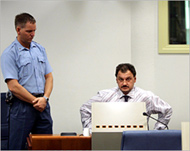Saddam trial judges ‘specially trained’
The Iraqi judges who will try Saddam Hussein and seven members of his deposed government next Wednesday in Baghdad have received special training from US, British and Australian experts that included a mock trial in London.

Saddam’s trial, on charges that could lead to the execution of the fallen Iraqi leader, will bear little resemblance to an American courtroom because Iraqi jurisprudence is based on French and Egyptian models.
There will be no jury. The chief judge – there will be three judges in all – will question witnesses, many of whom he will have interviewed before the trial, and the three judges will decide the guilt or innocence of Saddam and seven co-defendants.
They will appear before a Special Iraqi Tribunal on charges they ordered the 1982 killing of 143 people in Dujail, a mainly Shia town north of Baghdad, after a failed assassination attempt against Saddam.
There are allegations that 550 men, women and children were arrested without warrants and that torture and killings resulted.
Civil law system
Operating under a civil law system, the familiar Anglo-Saxon adversarial process of prosecution and defence lawyers jousting for advantage and scoring points with the jury, will not occur.
Saddam will sit alone, probably behind protective glass. He will have the right to call witnesses and, if convicted, to lodge numerous appeals before any sentence could be carried out.
If he is sentenced to death, he must be executed within 30 days of the ruling on his last appeal.
This description of the trial, which is sure to be given great attention worldwide, was provided on Tuesday by officials of the National Security Council and the State Department.
Western training
 |
|
Judges have also been trained at |
They said that despite the US, British and Australian technical training, which included advice from Case Western Reserve law professors, the trial is going to be run entirely by Iraqi judges.
The judges were trained and educated in Iraqi law but were not familiar with the humanitarian and war-crimes law that will pervade the trial, and that was the predominant area of training provided by outsiders, the officials said.
The war crimes law is not technically Iraqi but drawn worldwide from international statutes. Iraqi judges have been trained, as well, in Jordan, Italy and The Hague.
The court and the training, which was described as technical and significant, were financed by a $75 million US budget allocation in May 2004 and supplied over a year and a half partly to support investigations and prosecutions.
Televised?
The judges will be permitted to draw help from international advisers during the trial. Reporters are expected to be permitted to attend, but no decision has been announced on whether the trial will be televised.
The trial is expected to be the first of about a dozen involving allegations of crimes committed by Saddam and others during his 23-year rule.
Each defendant will have at least one lawyer. Saddam in August fired his entire defence team except for his principal attorney, Kahil Dulaimi. Several Iraqi lawyers have volunteered to assist him.
Dulaimi has petitioned the court to delay the opening session, saying that while it had two years to review the case he was given only two weeks.